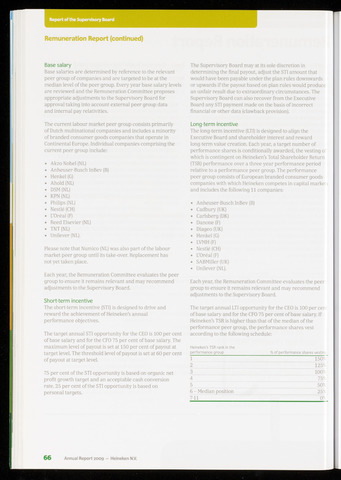Remuneration Report (continued)
66
Report of the Supervisory Board
Base salary
Base salaries are determined by reference to the relevant
peer group of companies and are targeted to be at the
median level of the peer group. Every year base salary levels
are reviewed and the Remuneration Committee proposes
appropriate adjustments to the Supervisory Board for
approval taking into account external peer group data
and internal pay relativities.
The current labour market peer group consists primarily
of Dutch multinational companies and includes a minority
of branded consumer goods companies that operate in
Continental Europe. Individual companies comprising the
current peer group include:
Akzo Nobel (NL)
Anheuser-Busch InBev (B)
Henkei (G)
Ahold (NL)
DSM (NL)
KPN (NL)
Philips (NL)
Nestle (CH)
L'Oréal (F)
Reed Elsevier (NL)
TNT (NL)
Unilever (NL).
Please note that Numico (NL) was also part of the labour
market peer group until its take-over. Replacement has
not yet taken place.
Each year, the Remuneration Committee evaluates the peer
group to ensure it remains relevant and may recommend
adjustments to the Supervisory Board.
Short-term incentive
The short-term incentive (STI) is designed to drive and
reward the achievement of Heineken's annual
performance objectives.
The target annual STI opportunity for the CEO is 100 per cent
of base salary and for the CFO 75 per cent of base salary. The
maximum level of payout is set at 150 per cent of payout at
target level. The threshold level of payout is set at 60 per cent
of payout at target level.
The Supervisory Board may at its sole discretion in
determining the final payout, adjust the STI amount that
would have been payable under the plan rules downwards
or upwards if the payout based on plan rules would produce
an unfair result due to extraordinary circumstances. The
Supervisory Board can also recover from the Executive
Board any STI payment made on the basis of incorrect
financial or other data (clawback provision).
Long-term incentive
The long-term incentive (LTI) is designed to align the
Executive Board and shareholder interest and reward
long-term value creation. Each year, a target number of
performance shares is conditionally awarded, the vesting o
which is contingent on Heineken's Total Shareholder Return
(TSR) performance over a three-year performance period
relative to a performance peer group. The performance
peer group consists of European branded consumer goods
companies with which Heineken competes in capital marke-
and includes the following 11 companies:
Anheuser-Busch InBev (B)
Cadbury (UK)
Carlsberg (DK)
Danone (F)
Diageo (UK)
Henkel(G)
LVMH(F)
Nestle (CH)
L'Oréal (F)
SABMiller (UK)
Unilever (NL).
Each year, the Remuneration Committee evaluates the peer
group to ensure it remains relevant and may recommend
adjustments to the Supervisory Board.
The target annual LTI opportunity for the CEO is 100 per cer
of base salary and for the CFO 75 per cent of base salary. If
Heineken's TSR is higher than that of the median of the
performance peer group, the performance shares vest
according to the following schedule:
Heineken's TSR rank in the
performance group of performance shares vestin
1
150?
2
125?
3
100?
4 75?
75 per cent of the STI opportunity is based on organic net
profit growth target and an acceptable cash conversion
rate. 25 per cent of the STI opportunity is based on
personal targets.
5 50?
6 ^Median position 25%
7-11
Annual Report 2009 - Heineken N.V.

